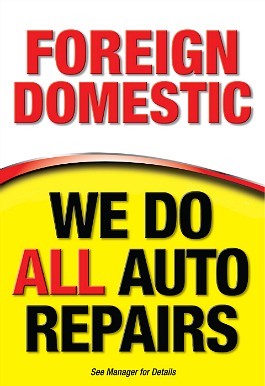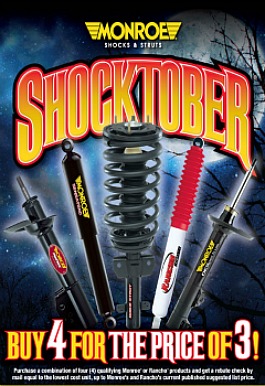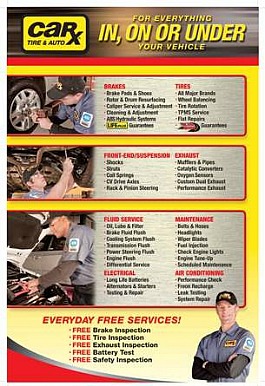 Steering & Chassis Repair
Steering & Chassis Repair
Steering and chassis go hand in hand. Many people think their car’s chassis is its body…the metal framework they sit in. This is not correct. The chassis is the bottom frame of the car, plus the “running gear” that makes it move: the engine, transmission, driveshaft, differential, and suspension. What we sit in is the “body" it’s constructed on top of the chassis.
Your Car-X Man is an expert on every part of your vehicle’s chassis, so when it comes to your engine, we can handle everything from a simple tune-up to a major repair.
Without proper maintenance, your transmission can cost you plenty. Car-X can help prevent problems with routine maintenance along with fluid flushes, fills, and repair.
Plus, regular driveshaft inspections are important. Your Car-X Man will inspect the universal joints, CV joints, axles differential and more every time your car is up on the lift.
We’ll check for leaks in your power steering column, perform a power steering flush, and perform any needed repairs that we may find. We’ll also check the belts for proper tension. We recommend having the fluid checked and belts inspected every three months or 3,000 miles. Power steering belts should be replaced every two years or 24,000 miles.
For more than thirty years Car-X has been helping folks keep their cars running right. We started out with mufflers but since have grown into total car care experts: brakes, shocks, tires, and engine repair—you name it; we’re good at it.
Axle & Drivetrain Repair
Axles are extremely important to your car. They are on par with brakes and tires when it comes to the safety of your vehicle.
Axles connect to the wheels and they bear the weight of your entire vehicle. They also may help drive your vehicle, and in most cars are integral parts of the steering system.
Most of us think of an axle as a bar between two wheels, or a straight axle, like you find on a train car or a little red wagon. The truth is, most axles are far more complex. That’s why it’s important to know an axle expert, like the Car-X Man, who can keep your car’s axles worry free.
Today, most axles are split axles, which means the wheel on each side is attached to a separate shaft. This allows independent suspension of the left and right wheels, and therefore a smoother ride. It also permits the left and right wheels to rotate at different speeds as the automobile turns, improving traction and extending tire-life. This is what’s known as the differential.
Many cars combine the transmission and the axle to create the transaxle. In rear-wheel vehicles, the engine is connected to a driveshaft, which turns the drive axle in the back of the car.
The axle is connected by the wheel to the CV joint. This is covered by a CV joint boot, a protective flexible covering. It’s important to make sure the boot is not cracked or leaking. This can cause brake fluid to leak out, possibly resulting in serious damage to the CV joints. Your Car-X Man will inspect your CV joint boots whenever he has your car up on the lift.
Your Car-X Man is an expert at maintaining all of types of axles, on all types of vehicles—SUVs, light trucks and foreign and domestic automobiles.
Springs & Suspension
Springs are part of your suspension system, without them, every ride would be a bumpy one.
Coil springs are the most common automotive springs. The coil spring is nothing more than a steel bar that has been bent into a flexible coil. The spring absorbs shock forces by compressing in and recoiling back to its original spring height. Coil springs can be located between control arms, frame and control arms and in most strut assemblies.
Most coil springs fail due to constant overloading, excessive up and down movement or just a general breakdown due to metal fatigue. Springs can also corrode and rust, especially in northern and midwestern states where there is a lot of road salt during the winter.
How do you know if you have a suspension problem? You’ll probably feel it if a spring fails, your ride will become hard and jarring. Failed shocks may result in excessive “bouncing” or up and down movement of your car’s front or back end. It may also become harder to steer, and could feel like your vehicle is pulling to the left or right.
It’s recommended you have your suspension system checked every 12,000 miles or 12 months.
For more than thirty years Car-X has been helping folks keep their cars running right. We started out with mufflers but since have grown into total car care experts: brakes, shocks, tune-ups, tires, and engine repair—you name it; we’re good at it.
Rack & Pinion Steering
Rack and pinion is the most popular type of steering system used in today’s cars. Keeping your steering and suspension running well is not only important for safety reasons it also enhances the comfort of your car.
Fortunately, your Car-X Man is an expert on rack and pinion steering. Car-X always provides you with a free inspection of your vehicle’s rack and pinion system.
Car-X Auto Service features trained, tested, and top-of-the-line technicians that can keep your car’s steering in tip top shape. They can help you maintain your rack and pinion steering system by checking the power steering pump belt, fluid level and condition, hoses, and the unit itself.
In the event you need an entire new system, our experienced technicians can professionally replace your rack and pinion for both domestic and import vehicles.
We have over three decades of experience maintaining the steering of cars, vans, SUVs and light trucks. So when it comes to your car’s steering, there’s no reason to take any chances. For everything from your vehicle's drive shaft to drive axle, your Car-X Man provides top-notch quality service you can count on.
For expert power steering service…"Don’t Worry . . .Call the Car-X Man!"
For a free estimate click here! Request an appointment with us today!




